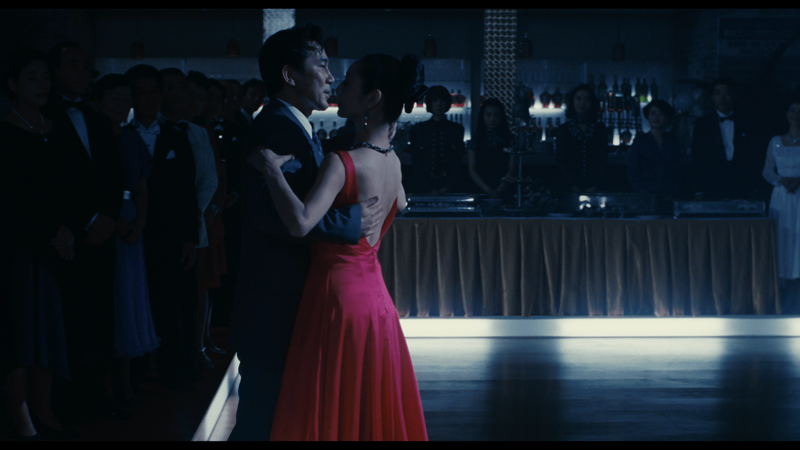
The Quiet Rebellion of Starting Over
MOVIE REVIEW
Shall We Dance?
–
Genre: Comedy, Drama, Music, Romance
Year Released: 1996, Film Movement 4K 2025
Runtime: 2h 16m
Director(s): Masayuki Suô
Writer(s): Masayuki Suô
Cast: Kôji Yakusho, Tamiyo Kusakari, Naoto Takenaka, Eri Watanabe, Yû Tokui, Hiromasa Taguchi, Reiko Kusamura, Hideko Hara
Languages: Japanese with English subtitles
Where to Watch: featuring 17 uncut minutes never before seen in North America, Masayuki Suô’s romantic drama opens at NYC’s Film Forum on May 30, 2025, before going wide to additional markets
RAVING REVIEW: There’s a rare comfort in stories that don’t feel obligated to shout over the noise. This one doesn’t rely on heavy drama—it simply shifts the focus to the quiet disruptions that gradually alter the tempo of a person’s life. What begins as a seemingly innocuous decision becomes the foundation for a story that’s more introspective than explosive. It unfolds with care, following a middle-aged man whose curiosity steers him toward a place he didn’t know he needed.
Shohei Sugiyama exists in a routine that, on the surface, seems perfectly sufficient. A reliable job, a home, and a family moving through the expected motions of life—it all adds up to something close to what most people call success. But beneath that surface lies a growing sense of vacancy. What nudges him out of his orbit isn’t a crisis, but a quiet moment: a glimpse of a woman in a dance studio window during his commute home.
Rather than charging ahead with a traditional character arc, the film opts to linger. Shohei’s journey begins not with a bold leap, but a minor step into a dance studio. The classes he joins are clumsy and unpolished. The early lessons, filled with missteps and physical awkwardness, aren’t dressed up with cinematic flashes. That’s part of the point. The messiness of learning something new is front and center, and the vulnerability in those moments gives the story traction.
Shohei’s transformation is handled with restraint. Koji Yakusho’s performance thrives on nuance, building the character’s emotion through small gestures and shifts. He doesn’t speak much about his feelings, and the film doesn’t force exposition to spell it out. Instead, viewers watch a man begin to move, not just in dance, but in life. Dance is not symbolic of reinvention. It becomes the space where Shohei reconnects with a part of himself that’s long been dormant.
The cultural framework adds another layer to his decision. In Japan, where public displays of affection and emotional openness are discouraged, dance—especially of the ballroom variety—isn’t just a quirky pastime. It brushes against expectations. There’s a quiet tension in Shohei’s choice to take lessons, an understated rebellion that may not translate to audiences outside of that context. That resistance, however gentle, adds gravity to his awakening.
Tomio, a colleague turned dance-floor sensation, offers a parallel story that brings levity and insight. Played with a specific energy by Naoto Takenaka, Tomio is all flamboyance and flair after hours. His transition from the office to after-hours exuberance isn’t just played for laughs. He unapologetically represents what it looks like to carve out space for joy. Rather than being a foil to Shohei, he becomes an unlikely guide—proof that self-expression doesn’t have to mean chaos, just a willingness to let go now and then.
Structurally, the film avoids formula. The dance competition near the end doesn’t function as a traditional climax. There’s no grand finale, no big emotional speech or last-minute decision that reshapes everything. Instead, the real victory is internal. Shohei’s presence—his willingness to show up and keep going—is what closes the arc. The story doesn’t need a trophy. It finds resolution in self-acceptance.
What stands out most is the film’s ability to balance humor and sincerity without ever tipping too far into either. The comedy isn’t forced, and the sentimentality never spills into sap. It simply observes, with compassion and curiosity. It trusts that its characters are enough, and that trust is well placed.
This isn’t about a man abandoning his life for a new one. It’s about him finding a different cycle inside the life he already has. Change doesn’t arrive in the form of escape or epiphany. It builds gradually, through repetition, reflection, and yes, a little bit of movement. The dance may be clumsy, but the act of showing up for it? That’s where the story lives.
Please visit https://linktr.ee/overlyhonestr for more reviews.
You can follow me on Letterboxd, Instagram, Twitter, and YouTube. My social media accounts can also be found on most platforms by searching for 'Overly Honest Reviews'.
I’m always happy to hear from my readers; please don't hesitate to say hello or send me any questions about movies.
[photo courtesy of FILM MOVEMENT CLASSICS]
DISCLAIMER:
At Overly Honest Movie Reviews, we value honesty and transparency. Occasionally, we receive complimentary items for review, including DVDs, Blu-rays, CDs, Vinyl Records, Books, and more. We assure you that these arrangements do not influence our reviews, as we are committed to providing unbiased and sincere evaluations. We aim to help you make informed entertainment choices regardless of our relationship with distributors or producers.
Amazon Affiliate Links:
Additionally, this site contains Amazon affiliate links. If you purchase through these links, we may receive a commission. This affiliate arrangement does not affect our commitment to honest reviews and helps support our site. We appreciate your trust and support in navigating these links.



Average Rating